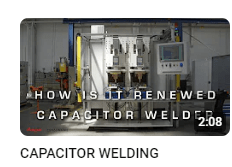- Products
- »
- Standard welding machines
- »
- Capacitor welding machines
Capacitor welding machines
Capacitor welding is a method used in industry that allows materials to be joined efficiently using electrical energy stored in capacitors. It is one form of resistance welding that is widely used in various industries, including automotive, electronics and medical device manufacturing. Capacitor welding is an advanced technique that offers many advantages over traditional resistance welding methods. Its ability to precisely join materials in a short period of time, with minimal thermal impact, makes it ideal for industries requiring high quality and precision. Despite some drawbacks, such as higher equipment costs, its unique advantages make it an investment worth considering for companies seeking to increase the efficiency and quality of their production processes.
A special feature of this welding technology, compared to conventional welding, is that the energy required for welding is not drawn directly from the power grid. Instead, the energy is stored in a capacitor battery, which is charged between welds, allowing the use of a low-power mains connection.
The capacitor battery discharges using a special pulse transformer, which transfers the energy to the welding circuit. Depending on the type of machine, currents in excess of 700 kA can be generated, and the welding time itself is only about 10 milliseconds.
What does capacitor welding consist of?
The process of capacitor welding involves charging capacitors to a high voltage and then discharging the stored energy in a very short time through the welded joint. This energy causes rapid heating and melting of the materials at the point of contact, leading to the formation of a permanent joint.
Advantages of condenser welding
- Precise energy control: With the ability to precisely control the amount of energy stored, condenser welding allows even very delicate materials to be joined with precision
- Short cycle time: The welding process takes only a few milliseconds, significantly increasing production efficiency
- Low thermal distortion: The short process time minimizes the effect of heat on surrounding materials so that parts maintain their dimensional accuracy after welding , which is especially important for precision electronic components
- High quality connections: Connections made by capacitor welding are characterized by high mechanical strength and low electrical resistance
- Low grid load and therefore low energy and consumption costs Cooling of electrodes is usually not necessary
- High repeatability of welding parameters
- Welding of metals with high electrical and thermal conductivity.
The main advantages of condenser welding over other forms of resistance welding are short cycle times and precise energy control. Welding with other methods requires longer operating times, which can lead to higher thermal distortion and lower quality joints. In addition, capacitor welding is more energy efficient because energy is stored and released very quickly, minimizing energy loss.


